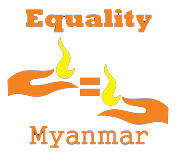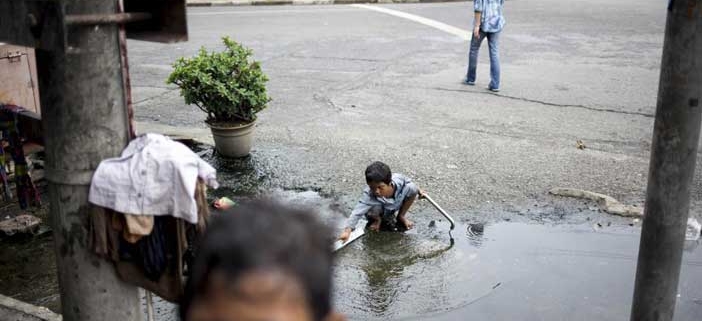The government has revealed plans for big care centres for street children and other homeless people, but civil society groups lament a lack of cooperation from officials in addressing the problem.
By CHERRY THEIN | FRONTIER
STREET CHILDREN have not been forgotten in the government’s 100-day plan, with proposals being discussed for big care and vocational training centres in Yangon and Mandalay to help improve the lives of some of the nation’s most underprivileged victims of poverty.
The government is also making an effort to better understand the circumstances of the homeless, including abandoned old people as well as street children.
The Minister for Social Welfare, Relief and Resettlement, U Win Myat Aye, told Frontier on July 25 that the ministry was cooperating with the Yangon and Mandalay regional governments on assessments of the homeless under the 100-day plan.
A meeting will be held with the regional authorities in the coming weeks to evaluate the completed assessments and set priorities, he said.
“What we need to do is undertake the assessments, classify the different groups, and provide rehabilitation and offer services based on their respective needs,” Win Myat Aye said, adding that the ministry could not achieve this on its own.
“We need helping hands,” he said. “We need contributions in terms of land or accommodation, budgeting, experts and labourers.”
Win Myat Aye said Yangon Region Chief Minister U Phyo Min Thein had promised to provide a 50-acre (20-hectare) plot for a multi-purpose rehabilitation centre, and the regional authorities in Mandalay had also agreed to provide land for a similar facility.
The proposed centres would provide education, training, health care and personal development programs and would supplement the activities of existing facilities in the two regions.
Win Myat Aye said that in response to a request from Phyo Min Thein, the ministry had drafted a plan for a project to improve the lives of the homeless, including street children and abandoned old people. The two sides would meet in the coming months to review the draft project, he said.
Win Myat Aye said the ministry would like to do more to help street children because of the numbers involved, but there were constraints on what it could do. The Department of Social Welfare provided services to street children but it was limited to those involved in criminal cases, he said.
“However, we have our draft plan for a huge rehabilitation centre,” Win Myat Aye said.
Although an objective of the 100-day plan was to identify priority issues for reform, the minister said a long-term effort, over many years, would be needed to issue national identity cards to street children who lacked them and to implement vocational training programs.
He said the assessments in Yangon and Mandalay would be followed by similar exercises in Nay Pyi Taw, Bago and Mawlamyine.
Meanwhile, the Ministry of Education has unveiled plans to establish a Department of Alternative Education as part of its effort to improve the lives of disadvantaged children.
The move reflected the government’s determination to provide greater opportunities for disadvantaged children, the Minister for Education, Dr Myo Thein Gyi, told a forum on alternative education in Nay Pyi Taw on July 6.
The forum was told the ministry planned to invest K1 billion in an alternative education program for children aged under 16 who had dropped out of school. The program is aimed at educating children with special needs and those in conflict zones, as well as those living on the streets.
The 2014 census showed that about 1.7 million children aged between five and 16 did not attend school.
Thwe Let Myar, a charity group based in Yangon, last month began teaching basic skills, including literacy, to street children in a space beneath the Hledan overpass for 90 minutes each evening. The group has more than 20 members who volunteer their services as teachers to the children, who appear to welcome the opportunity to acquire an education.
“Most of the children on the streets are disadvantaged and vulnerable; they need understanding, love and recognition,” a member of the group who requested anonymity, told Frontier on July 30. “We do as much as we can, but cannot say how long we can do it because it depends on circumstances.”
U Aung Myo Min, the executive director of Equality Myanmar, an NGO that provides human rights education, said he appreciated the references to street children in the 100-day plan because their plight had previously been ignored.
However, he criticised the plan for lacking a clear strategy and follow-up measures.
“We do not want street children to be forcibly removed from the streets but there should be greater emphasis on ways of ensuring that children never end up living on the streets,” Aung Myo Min told Frontier on July 26.
He said it was wrong to regard the Ministry of Social Welfare, Relief and Resettlement as the only stakeholder and an holistic approach was needed to address the problem, involving other ministries, such as Labour, Immigration and Population and Planning and Finance, as well as civil society groups and NGOs.
Aung Myo Min said committees established at the township level under the Ministry of Social Welfare, Relief and Resettlement to promote the protection of children and their rights were not working properly. Some were not aware of what was happening in their own townships, he said.
Aung Myo Min also expressed concern about some of the officials in charge of youth rehabilitation centres. Some, he said, were “not the right person in the right place”. Under their management, the centres are instead widely regarded as prisons.
Another problem at the centres was inadequately trained personnel who, although they treated children well, lacked knowledge of effective rehabilitation techniques or how to manage psychological trauma.
Myanmar is one of more than 190 countries that have ratified the 1989 United Nations Convention on the Rights of the Child, under which all children have equal rights under the law.
“There are laws to protect children in Myanmar but they’re weak in practice,” said Aung Myo Min. “Myanmar ratified the convention on July 16, 1991, but needs to do more to address issues, including the abuse and trafficking of children, many of who are street children.”
Article 4 of the CRC obliges signatories to undertake all appropriate legislative, administrative and other measures to implement the rights outlined in the convention.
Aung Myo Min said a challenge confronting the reform process was an apparent reluctance of those in government to engage in dialogue with civil society organisations.
“CSOs don’t want to take over, we just want government officials to trust, recognise and work with us,” he said.
U Soe Htun, a member of the National Network for Education Reform working committee, agreed that the National League for Democracy government was not working closely with civil society despite promising to be cooperative.
“It was easier to meet officials and members of parliament during the previous government than now, let alone have a discussion. What is happening now, we have no idea,” Soe Htun told Frontier on July 29.
He acknowledged that the democratic reform process faced many challenges, but expressed regret that civil society and the public have not been able to contribute to policy-making.
“We feel sorry that government cooperation with civil society is still weak,” Soe Htun said.
If the government really wanted to improve the lives of children living on the streets it could do so immediately with the assistance of experienced CSOs, community-based organisations, INGOs and NGO who were ready to help, he said.
Soe Htun dismissed as an excuse, claims by officials that infrastructure was lacking to accommodate the homeless.
There were many unused and abandoned government buildings throughout the country that could be used to provide shelter as well as education and other services for the disadvantaged, including street children and abandoned old people, he said.
“The street children issue has been neglected in this country for too long and it is time for the government to do something about it, including giving them better access to non-formal education,” Soe Htun said.


 Equality Myanmar (EQMM) is a leading nongovernmental organization that organises a wide range of human rights education and advocacy programs, the documentation human rights violations, and provides emergency support for activists, human rights defenders, and their families. We work with a range of local civil society organizations, educators, activists, various local actors, and our programs and activities reach all states and regions in Myanmar.
Equality Myanmar (EQMM) is a leading nongovernmental organization that organises a wide range of human rights education and advocacy programs, the documentation human rights violations, and provides emergency support for activists, human rights defenders, and their families. We work with a range of local civil society organizations, educators, activists, various local actors, and our programs and activities reach all states and regions in Myanmar.
